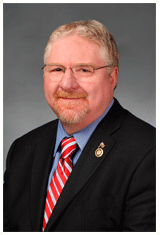On Wednesday, Jan. 21, the governor gave his annual State of the State address, during which he outlined his legislative priorities for 2015. Many of the topics he hit upon were ones the Legislature is already addressing, such as supporting our agricultural industry, harnessing new technology to create jobs and expanding educational opportunities for Missourians. These are bipartisan goals. Differences arise in how we use limited funds to reach those goals. This is reflected in the governor’s budget recommendations, which were also delivered to legislators on Wednesday.
The Senate Appropriations Committee will use those recommendations as a template for crafting its version of the Fiscal Year 2016 budget. In December, the governor and House and Senate appropriations’ chairmen and staff agreed on a general Consensus Revenue Estimate. This number is based on future revenue collections, which have been pegged to increase over last year’s by 3.6 percent, giving us a total general revenue operating budget of $8.673 billion.
There will inevitably be changes between the governor’s budget and the one created by the Legislature. Despite a positive economic outlook for our state, it’s important we maintain the fiscal responsibility that allowed us to weather the years of budgetary shortfalls. We have to continue finding ways to make government more effective and efficient, regardless of the revenue estimates.
Committees also began meeting this week to debate some of the more prominent bills for this session. On Wednesday, the Senate Governmental Accountability and Fiscal Oversight Committee met to discuss Senate Bill 14. Currently, citizens can access the Missouri Accountability Portal to see exactly how their tax dollars are being spent. However, only limited information is available when a state department or agency contracts for legal services. A number of agencies seek private legal services, including the Attorney General’s office.
Senate Bill 14 would require departments and agencies to list any legal services provided by a private law firm, the amount paid, a brief summary of the legal services provided, and a copy of the contract. I’ve always believed citizens have a right to know how their funds are being spent. This legislation adds more transparency to state government, which should be an ongoing goal of the Legislature. The government is an institution for the people, and should be accountable for the funds it uses.
Also debated this week in the Jobs, Economic Development and Local Government Committee was Senate Bill 5, which reduces the threshold for the general operating revenue coming from traffic fines for municipalities from 30 percent to 10 percent. In the mid-1990s, the Missouri Legislature passed what is known as the Macks Creek Law, which limited cities and towns in the state from collecting more than 45 percent of their total revenue from speeding tickets. The law was later updated to cap the amount of revenue at 30 percent. The measure was named after the town of Macks Creek, once known for being a notorious speed-trap for Missouri motorists. Macks Creek was found to be collecting more than 80 percent of its revenue from traffic tickets. The law ended the practice.
Under Senate Bill 5, which modifies the Macks Creek Law, local municipalities would only be allowed to fund 10 percent of their budgets with revenue generated by traffic tickets or fines. Any revenue collected above that threshold would be sent to the Department of Revenue, which would then annually distribute the funds to the schools of the county in the same manner other penalty proceeds are distributed.
While I agree the practice of speed-traps and over-zealous traffic ticketing to drum up local revenue is unfair, I also have my reservations about this bill. From what I’ve heard, the problems that spurred the filing of this measure have been happening mainly in the St. Louis area, not necessarily in the numerous rural towns and cities throughout our state that have been following the law. If passed, this bill could affect whether rural communities could afford law enforcement.
I wish that in crafting this legislation, members would have considered targeting specifically those municipalities that are abusing the practice, instead of imposing a solution on areas where there wasn’t a problem to begin with. As this legislation moves forward, I hope my colleagues consider how it would affect all of Missouri and take a balanced, careful approach.
If you have any questions or comments about this or any other matter regarding your state government, please feel free to contact me at (573) 751-1503; you are also welcome to e-mail me at jay.wasson@senate.mo.gov. |



